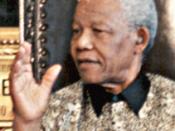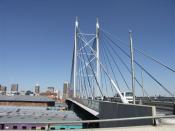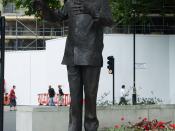Nelson Mandela and the Anti-Apartheid Movement in South Africa
Apartheid - means "separateness" in the Afrikaans language. It describes the racial division between the governing white minority population and the non-white population.
1948 - The National Party gains control of South Africa, and introduces apartheid as one of their policies.
1950 - Group Areas Act is enacted. It gives a small percentage of land to the black population, while the white minority gains control of 80% of South Africa.
1960 - The government bans all opposition groups, which includes the ANC (African National Congress). Police kill 69 unarmed protesters in Sharpeville.
1964 - Nelson Mandela, the main leader of the ANC, is convicted of sabotage and trying to overthrow the government. He is sentenced to life in prison.
1976 - In an effort to suppress civil unrest and protest, the government kills 575 people over eight months.
1986 - Widespread strikes and riots occur frequently. A national state of emergency is imposed, allowing unlimited powers to the police and restrictions on the press.
1989 - F.W. de Klerk of the National Party is elected president. His goal is to scrap the Separate Amenities Act, and end apartheid.
1990 - Nelson Mandela is released after 27 years in prison. African political organizations are legalized.
1993 - After violent riots that claim 1,500 lives in less than a year, the National Party and the ANC agree on a "government of unity", in which both parties will be partners for the time being.
1994 - Mandela and de Klerk each launch their own campaigns. The elections are held, and blacks are given their first opportunity to vote. Mandela declares an ANC victory, and de Klerk offers his cooperation.
African National Congress - The ANC is a national liberation movement formed...


